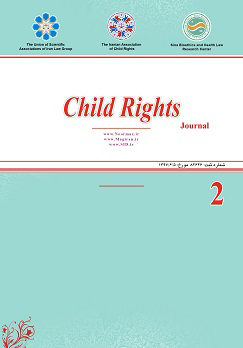Research Ethics and Children's Rights
Subject Areas : child rights
1 - Post-Doctoral Researcher, Medical Ethics and Law Research Center, Shahid Beheshti University of Medical Sciences, Tehran, Iran
Keywords: Human Rights, Children Rights, Ethical Principles, Research Ethics Guidelines, UNCRC,
Abstract :
Background and aim: Despite the increasing global attention on the societal need to respect the principles of children's participatory rights in which children are involved, surprisingly, the relationship between children's rights and research ethics is not clear and research ethics for children’s rights have been neglected in the social sciences literature. The aim of this study is to determine the relation of the ethical guidelines with children’s right. Method: This analytic study conducted to analyze the ethical research considerations from human rights and child right perspective. Results: Our analysis revealed that although the human right principles referred to in the social research ethical guidelines, the definition of “right” and especially children rights are ignored. Within the social sciences research ethical guidelines, including those related to children, there is often a lack of direct referral to the human rights principles emphasized by the UN Convention on the Rights of the Child (UNCRC). Conclusion: Linking the human rights principles within research ethics guidelines will promote and encourage a rights-based approach to child research. These specific Research ethics guidelines need to be drawn upon the UNCRC.
1. UN Special Session on Children. A world fit for us: children's forum message. 2002. Accessed Aug, 2005. Available at: http://www.unicef.org/specialsession/documentation/childrens-statement.htm.
2. Mishna F, Antle BJ, Regehr C. Tapping the perspectives of children: Emerging ethical issues in qualitative research. Qualitative Social Work 2004; 3(4): 449-468.
3. Maguire M. What if You Talked to Me? I could be interesting! Ethical research considerations in engaging with bilingual/ multilingual child participants in human inquiry. Forum: Qualitative Social Research 2005; 6(1): Art.4. Available at http://www.qualitative-research.net/index.php/fqs/article/view/530/1 148. Accessed June, 2019.
4. United Nations Human Rights office of high commissioner. What are human rights? Available at: https://www.ohchr.org/EN/Issues/ Pages/WhatareHumanRights.aspx. Accessed June, 2019.
5. Universal Declaration of Human Rights. 1948. Available at: https://www.un.org/en/universal-declaration-human-rights/; https://www. ohchr.org/EN/UDHR/Documents/UDHR_Translations/ eng.pdf.
6. World Medical Association, Declaration of Helsinki. Bulletin of the World Health Organization 2001; 79(4): 373-374. Available at: https://www.apps.who.int/iris/handle/10665/268312.
7. World Medical Association. World Medical Association Declaration of Helsinki: Ethical principles for medical research involving human subjects. JAMA 2013; 310(20): 2191-2194.
8. Declaration of Helsinki. Available at: http://www.cirp.org/library/ ethics/helsinki/Economic and Social Research Council. 2005.
9. Freeman M. The future of children's rights. Children and Society 2000; 14(4): 277-293.
10. Smith AB, Taylor N. Rethinking children's involvement in decision - making after parental separation. Childhood 2003; 10(2): 201-216.
11. Hill M. Ethical considerations in researching children's experiences. In Researching children's experiences. Edited by Greene S, Hogan D. London: Sage; 2005. p.61-86.
12. Hopkins P, Hill M. This is a good place to live and think about the future… the needs and experiences of unaccompanied asylum-seeking children in Scotland. Glasgow: University of Glasgow, Glasgow Centre for the Child & Society & the Scottish Refugee Council; 2006.
13. Schenk K, Williamson J. Ethical approaches to gathering information from children and adolescents in international settings: Guidelines and resources. Washington: The Population Council Inc; 2005. Available at: http://www.social-policy.org.uk/downloads/SPA_ code_ethics_jan09.pdf.
14. American Association for the Advancement of Science and Physicians for Human Rights. Human rights and health: The legacy of apartheid. 1998. Available at: http://shr.aaas.org/loa/index.htm.
15. Morrow V, Richards MPM. The ethics of social research with children: An overview. Children and Society 1996; 10(2): 90-105. Available at: https://doi.org/10.1111/j.1099-0860.1996.tb00461.x.
16. McIntosh N. Guidelines for the ethical conduct of medical research involving children. Archives of Diseases of Childhood 2000; 82(2): 177-118. Available at: http://dx.doi.org/10.1136/adc.82.2.177.
17. Jesani A, Barai T. Ethical guidelines for social science research in health. The Indian National Committee for Ethics in Social Science Research in Health (NCESSRH). Mumbai: Centre for Enquiry into Health and Allied Themes; 2004. Available at http://www.fabtp.com/ wp-content/uploads/2010/07/NCESSRH-Guidelines.pdf.
18. The National Committee for Research Ethics in the Social Sciences and the Humanities. Guidelines for Research Ethics in the Social Sciences, Humanities, Law and Theology. 4th ed. The Norwegian National Research Ethics Committees; 2016.
19. Alderson P, Morrow V. Ethics, social research and consulting with children and young people. London: Barnardos; 2004.


